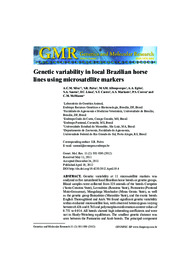Genetic variability in local Brazilian horse lines using microsatellite markers.
Genetic variability in local Brazilian horse lines using microsatellite markers.
Resumo: Genetic variability at 11 microsatellite markers was analyzed in five naturalized/local Brazilian horse breeds or genetic groups. Blood samples were collected from 328 animals of the breeds Campeira (Santa Catarina State), Lavradeira (Roraima State), Pantaneira (Pantanal Mato-Grossense), Mangalarga Marchador (Minas Gerais State), as well as the genetic group Baixadeiro (Maranhão State), and the exotic breeds English Thoroughbred and Arab. We found significant genetic variability within evaluated microsatellite loci, with observed heterozygosis varying between 0.426 and 0.768 and polymorphism information content values of 0.751 to 0.914. All breeds showed high inbreeding coefficients and were not in Hardy-Weinberg equilibrium. The smallest genetic distance was seen between the Pantaneira and Arab breeds. The principal component analyzes and Bayesian approach demonstrated that the exotic breeds have had a significant influence on the genetic formation of the local breeds, with introgression of English Throroughbred in Pantaneira and Lavradeira, as well as genetic proximity between the Arab, Pantaneira and Mangalarga Marchador populations. This study shows the need to conserve traits acquired by naturalized horse breeds over centuries of natural selection in Brazil due to the genetic uniqueness of each group, suggesting a reduced gene flow between them. These results reinforce the need to include these herds in animal genetic resource conservation programs to maximize the genetic variability and conserve useful allele combinations.
Ano de publicação: 2012
Tipo de publicação: Artigo de periódico
Unidade: Embrapa Gado de Corte
Observações
1 - Por padrão são exibidas publicações dos últimos 20 anos. Para encontrar publicações mais antigas, configure o filtro ano de publicação, colocando o ano a partir do qual você deseja encontrar publicações. O filtro está na coluna da esquerda na busca acima.
2 - Para ler algumas publicações da Embrapa (apenas as que estão em formato ePub), é necessário ter, no celular ou computador, um desses softwares gratuitos. Sistemas Android: Google Play Livros; IOS: iBooks; Windows e Linux: software Calibre.
Acesse outras publicações
Acesse a Base de Dados da Pesquisa Agropecuária (BDPA) para consultar o acervo completo das bibliotecas da Embrapa.

